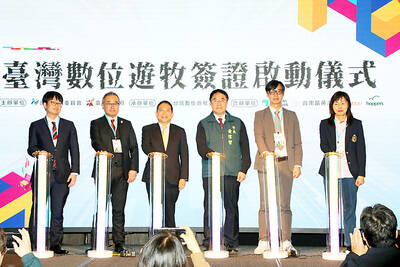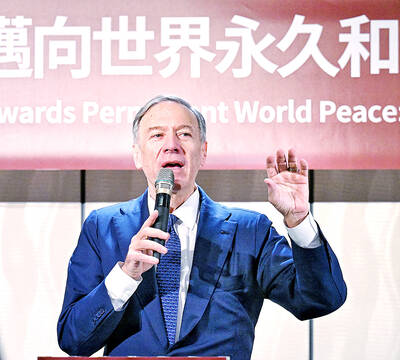Legislators across party lines yesterday voted to pass the Act Governing Development of Renewable Energy (再生能源發展條例), nine years after the bill was proposed.
The Act empowers the Ministry of Economic Affairs (MOEA) to reward power companies that have generated between 6.5 million kilowatts and 10 million kilowatts of electricity from renewable energy sources. The Act also grants tax breaks to renewable power companies when they import power equipment that is not available in Taiwan.
The government should invite academics, experts and organizations to deliberate rates for renewable energy before publicizing the price, the Act stipulates. It also requires the government to promote renewable energy use every other year for two decades once the law takes effect.
The government should adopt renewable power equipment for new government, school or state-run enterprise buildings, it says. Farmers who grow crops that are used to generate renewable energy on fallow farms will also be entitled to government subsidies from the nation’s Agriculture Development Fund, the Act says.
The Act stipulates that the MOEA has the authority to request data from renewable power companies on the operation of renewable energy equipment and to dispatch personnel to inspect the equipment, adding that the companies cannot reject inspections.
Companies may be fined between NT$300,000 (US$9,100) and NT$1.5 million for rejecting inspections and between NT$200,000 and NT$1 million for failing to provide related documents within a specified timeframe.
Democratic Progressive Party (DPP) Legislator Pan Meng-an (潘孟安) described the passage of the bill as “a milestone in Taiwan’s economic development.”
“As a member of the internatinal community, Taiwan should carry out its responsibility. Developing green energy is necessary because conventional energy sources will be exhausted in the future,” Pan said.
DPP Legislator Tien Chiu-chin (田秋堇), who had been pushing the bill, said legislators had done something good for future generations.
“We have proven that the economy and environmental protection can coexist,” she said.
Renewable energy development was brought into the spotlight after German wind-power firm InfraVest GmbH — the only private producer of wind energy in Taiwan — threatened in early April to pull out of the country.
The bill had been stalled in the legislature for about nine years. The main reason it was in limbo was that lawmakers representing special interest groups haggled over the purchase prices of specific renewable resources.
Meanwhile, the National Science Council (NSC) yesterday announced that it had budgeted NT$30.3 billion to be spent over the course of five years for a national energy research project, with half the budget to be devoted to studies on solar energy, wind power, bio-energy and 22 other alternative sources of energy.
The budget will be appropriated in four areas: conserving energy and reducing carbon dioxide emissions, developing new energy sources, energy use and development strategies, and personnel training and education, the NSC said.
Approximately NT$11.47 billion will be allocated for conserving energy and reducing emissions. About NT$14.9 billion will be allocated to developing new energy technology.
The NSC has also budgeted NT$1.22 billion for planning energy use and development strategies and NT$2.05 billion for personnel training and education.

ANNOUNCEMENT: People who do not comply with the ban after a spoken warning would be reported to the police, the airport company said on Friday Taoyuan International Airport Corp on Friday announced that riding on vehicles, including scooter-suitcases (also known as “scootcases”), bicycles, scooters and skateboards, is prohibited in the airport’s terminals. Those using such vehicles should manually pull them or place them on luggage trolleys, the company said in a Facebook post. The ban intends to maintain order and protect travelers’ safety, as the airport often sees large crowds of people, it said, adding that it has stepped up publicity for the regulation, and those who do not comply after a spoken warning would be reported to the police. The company yesterday said that

QUIET START: Nearly a week after applications opened, agencies did not announce or promote the program, nor did they explain how it differed from other visitor visas Taiwan has launched a six-month “digital nomad visitor visa” program for foreign nationals from its list of visa-exempt countries who meet financial eligibility criteria and provide proof of work contracts. To apply, foreign nationals must either provide proof that they have obtained a digital nomad visa issued by another country or demonstrate earnings based on age brackets, the Bureau of Consular Affairs said. Applicants aged 20 to 29 must show they earned an annual salary of at least US$20,000 or its equivalent in one of the past two years, while those aged 30 or older must provide proof they earned US$40,000 in

UNITY MESSAGE: Rather than focusing on what Trump said on the campaign trail about Taiwan, Taipei should be willing to engage with the US, Pompeo said Taiwan plays a key role in Washington’s model of deterrence against China, former US secretary of state Mike Pompeo said in a speech in Taipei yesterday. During US president-elect Donald Trump’s first term, “we had developed what we believe was a pretty effective model of deterrence against adversaries who wanted to undermine the set of rules and values that the people of Taiwan and the people of the US hold dear,” Pompeo said at a forum organized by the Formosa Republican Association. “Succeeding in continuing to build this model will not solely rest at the feet of president Trump and his team,
TECH CORRIDOR: Technology centers and science parks in the south would be linked, bolstering the AI, semiconductor, biotech, drone, space and smart agriculture industries The Executive Yuan yesterday approved a “Southern Silicon Valley” project to promote the development of an artificial intelligence (AI) and semiconductor industry in Chiayi County, Tainan, Pingtung County and Kaohsiung. The plan would build an integrated “S-shaped semiconductor industry corridor” that links technology centers and science parks in the south, Executive Yuan spokesperson Michelle Lee (李慧芝) said yesterday after a Cabinet meeting. The project would bolster the AI, semiconductor, biotech, drone, space and smart agriculture industries, she said. The proposed tech corridor would be supported by government efforts to furnish computing power, workforce, supply chains and policy measures that encourage application and integration